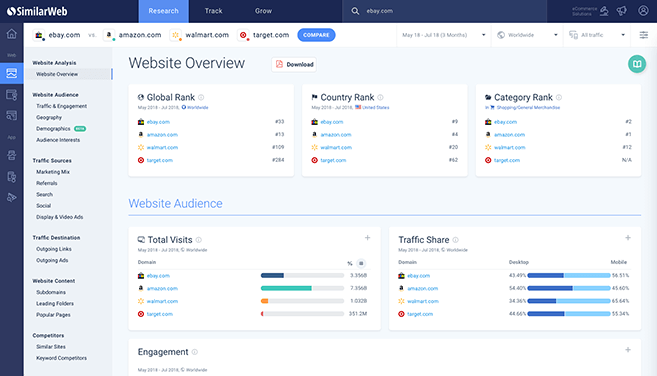
If you’ve just started your eCommerce journey, it’s easy to get overwhelmed with the amount and complexity of information available regarding how to build a successful store. In the spirit of making things easier for you, we’ve compiled a list of 11 free eCommerce tools you can use to start growing your online business.
You’ll find tools to help you with Analytics, research, SEO, and marketing. Let’s get started.

Hotjar is an in-depth and user-friendly data analyzing software for your website. It’s is the perfect behavior analytics tool that provides website visitor behavior analysis and feedback.
Using key features like heatmaps, session recordings, and surveys, you can understand what’s going on with your website in terms of how visitors interact with it. You can use these features to understand how users scroll, click, navigate, and pay attention to sections on your website.
Hotjar also helps you make sense of all this data, it helps you with why people interact the way they do.

It allows you to collect instant feedback from customers and create surveys to get answers for any behavioral questions you may have in mind.
Google Analytics is a free to use tool with tons of functionality.
It is very easy to use, install, and it provides real-time and customized reports, along with wide-ranging insights into user behavior. You can easily access detailed information on your online store performance. You can make improvements to your website by being able to track internal search sites. It provides you with excessive information on the age, location, number of visitors, and their time period of stay on your website.
One of the most attractive features of Google Analytics is that it automatically generates reports on your website which you can access immediately, saving you a lot of manual labor.

With Google Analytics, you get access to traffic information, where the traffic comes from, which pages people mostly visit, and how long they spend on these pages.
It also shows you user demographics, the devices they use to browse your store, and where they log in from.
This is just the tip of the iceberg with Google Analytics as you can really deep dive into the software to conduct advance analysis and create detailed custom reports on many aspects of how visitors interact with your website.
Google Analytics is completely free to use.

Conversific is an analytics tool for Shopify that assists you to optimize your traffic and conversion, gather better data, and grow online sales.
Conversific assists your business growth by giving you insights on which products should be featured, which marketing channels are working well. It helps you build a better understanding of the business atmosphere by comparing your site to competitors, providing revenue reports, and stats conversions and site performance. It can provide you with tips for your future strategies to help you focus on improvement and change for a more profitable store.
It also helps boost productivity by offering features like personalized to-do lists, and the free version offers you data for 1500 orders and access to 5 reports.


Surveymonkey is one of the most popularly used online survey software. Every store owner needs feedback, criticism, and suggestions from their customers. If you’re looking for software that creates professional surveys, offers multiple templates, and is convenient to use, SurveyMonkey is definitely what you need.
The free version offers 10 questions per survey and 100 responses per survey with a wide variety of 31 survey templates and 15 variations of questions including subjective, objective, quantitative, or qualitative questions and answers. On top of that, these surveys are super easy to send through a number of ways including email, social media, and popup forms on your website.


If you want to know about your competitors’ traffic sources and what channels generate the most traffic for them, then you need to check out Similarweb.
Similarweb provides you with a rough calculation of how much traffic different sites are getting. You can see the traffic overview of a site, the total visits they have gotten over a month, an average of how many visitors they had, the duration of the visitors, and their bounce rates.

It gives you a complete picture of your competitors’ performance so you can plan your own marketing accordingly, and also discover which channels they are using to the most success.
With their free plan, you get 5 competitor results per metric, 1 month of the mobile app, and 3 months of web traffic data.
Undoubtedly, keyword research and planning are critical to any website’s SEO strategy. Google Keyword Planner is a free to use SEO tool to help you uncover which keywords are relevant to your business, so you can create content and ads accordingly.
Keyword planner offers you suggestions for keywords according to your business domain, the monthly volume of those keywords in search results.
Check out this guide by Ahrefs to get an in-depth look into how to use this tool.


The Keyword Rank Tracker feature in Sitechecker monitors a website's search engine ranking for specific keywords over time. It provides accurate and current information for making data-driven decisions about SEO strategy.
This tool tracks keyword rankings across multiple search engines, including Google, Bing, and Yahoo. Users can monitor their website's rankings for various keywords, including long-tail keywords. The feature also enables users to analyze their competitors' search engine rankings and identify ways to improve SEO performance.

Use Buffer to smartly manage your social media and get more audience visiting your store. Buffer saves your time and simplifies the approach to social media content posting by letting you plan, schedule, and post through a single platform. It will allow you to schedule posts, comments, tweets, and other updates along with being able to contact your followers through different accounts. The free version also gives you access to creating one custom schedule per platform. What more do you need?


Running out of ideas on what to post on your social media sites? Canva is here to take away your worries. It’s one of the best apps to use for creating, editing, and designing social media posts to engage a larger audience.
Canva allows you to choose from a wide variety of templates, with easy to use features including social media images, presentations, marketing materials, you name it! It’s super convenient and no level of skill is required in order to use this app. So for those of you who haven’t already joined Canva, go ahead, it’s free.

Mailmunch is a powerful email marketing tool that leads you to collect visitors and convert them into leads and then leads into customers.
Once you have this app up and running on your store, you can use it to create popups, landing pages, scroll box forms, and many others to entice your visitors with attractive offers or present them with critical information.
Once you collect subscribers with these pages and forms, you can create custom and automated email campaigns for these leads to give them sales updates, announce new products, or any other news you may have to share.

The software is intuitive and easy to use. The drag and drop builder comes pre-loaded with hundreds of templates to allow you to easily and quickly build forms and landing pages.
The free version of Mailmunch lets you collect unlimited subscribers and gives you access to many forms and popups.
Diving into the world of ecommerce and looking for a great tool to get started? Look no further than Omnisend.
One of the biggest misconceptions when it comes to email marketing is that it has to be expensive to be effective—and Omnisend easily busts that myth. This email & SMS platform is tailor-made for ecommerce beginners, with features that help budding online businesses flourish, drive sales, and foster customer relationships.

With Omnisend, you get a comprehensive toolbox to grow your subscriber list and send email, SMS, and push notifications all under one roof. It offers advanced segmentation capabilities, ready-to-use templates for signup forms and emails, as well as preset workflows for welcoming new subscribers, addressing cart abandonment, and handling post-purchase communications.
What's more, Omnisend’s email builder seamlessly integrates with all major ecommerce platforms like Shopify and WooCommerce, letting you effortlessly incorporate products into your emails, complete with images, titles, prices, and descriptions.
The icing on the cake? Omnisend's powerful automation. From welcome emails, product recommendations, and birthday promos to SMS alerts and review solicitation–set them up once, and Omnisend ensures they're dispatched at optimal moments.

Do you want to produce stunning designs consistently that speak for your eCommerce brand? DocHipo provides beautiful templates for designing social media posts, advertisement graphics, web banners, infographics, and presentations covering various industries.
Its design assets library containing appealing illustrations, stickers, icons, and animations helps your marketing content stand out. You can access unlimited pictures from the stock photo library in the DocHipo editor and edit them with a built-in photo editor to make them look enticing. You can download your designs in PNG and JPG without any watermark in the free version.
DocHipo’s intuitive drag-and-drop editor and ease of use make it one of the best free tools for eCommerce beginners.

With Woorise you can craft attention-grabbing landing pages, interactive forms, compelling surveys, entertaining quizzes, and viral giveaways – all seamlessly unified in one user-friendly interface. Tailor your campaigns, select from a diverse collection of over 100 templates, and stay effortlessly updated with real-time email notifications.

Woorise effortlessly integrates with key platforms like Mailchimp, HubSpot, Facebook, and Google Analytics, making lead management a breeze. With Woorise, beginners in the ecommerce arena can confidently navigate the digital landscape, leveraging essential marketing tools for a successful online journey. Experience the power of Woorise and set your ecommerce endeavors in motion.

If you're having a hard time finding products to sell in your store, Oberlo will make your work easier by finding products to sell online ranging from electronics to makeup. You can use Oberlo to find products from anywhere in the world and add them to your store. Another added benefit of Oberlo is that you don’t need to worry about storing, packaging, or shipping your products, your supplier will directly ship the product to your customer!

Aftership makes it so e-commerce sellers can provide customers with real-time shipping and delivery updates. Though paid plans are available, the company offers a “forever free” basic plan for merchants shipping fewer than 100 products per month.

It easily integrates with a host of eCommerce store providers and offers a load of functionality. The free version gives you:
A customized delivery experience with a tool like Aftership can make your customers happy and more likely to shop with you again.

Chisel is a popular Product Management tool that assists in creating roadmaps, building team alignments, and collecting customer feedback. It is a quick and straightforward way to manage product development, from market research to product launch.
It provides a simple, visual interface that makes tracking progress easy and keeps everyone on the same page.
Chisel aids all the teams by providing them with a wide array of features. Such as Prioritization matrix, Kanban, timeline and release view, ideabox, Customer Surveys (with 100 free responses in the free forever plan), and many more that can help you kickstart your product journey in no time.
Chisel is designed to help both small-scale and large-scale companies. The tool offers an essential free plan for small teams. It has all the crucial features to get you started making it a fantastic option for businesses on a tight budget.
Premium and enterprise plan provides access to various invaluable integrations like Jira, Azure DevOps, etc. All of this at a minimal price.

Chisel offers an essential free forever plan. The paid plan starts with $49 per month ( billed monthly/annually).
Building a new online store can be a hard job.
However, these 11 tools can help you grow your business without spending an additional dime. They can help you analyze your business, customers, behaviors, and competitor.
These free tools offer essential features for a new store to get going. From being able to have reports and analysis of your store, keeping in check your progress, designing quality content for social media, to getting feedback, these tools will assist you with all these tasks.
However, it’s recommended that once your store is up and running and you get a hang of these tools, to truly make use of these tools, you should consider switching to paid versions later.
Rukham is the Content Lead at Mailmunch. He believes trust should be the basis for all marketing communications.
Tags:

Hamna Abid
July 11, 2023

Hamna Abid
June 23, 2023

Ammar Mazhar
May 30, 2023